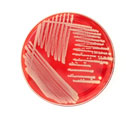
Most people aren't aware that hospitals are breeding grounds for superbugs which are bacteria that are hard to kill.
One of these superbugs is Klebsiella pneumoniae which is resistant to all antibiotics used to treat these types of infections. Klebsiella is now responsible for sixty percent of all intensive care unit infections.
One reason hospitals are ideal environments for superbugs is that people who are sick can have weaker immune systems. And they're often on antibiotics, giving bacteria the "learning curve" to evolve and develop resistance.
Scientists studying these hardy bacteria recently discovered one of its defenses. Typically, in a bacterial population, only a few may become highly resistant. But this small group can improve the survival of the entire population by working together as a unit.
They do this by producing a "signaling" molecule called indole which warns the bacterial community of the presence of antimicrobial drug. The bacteria then activate protective mechanisms such as molecular pumps that can prevent antibiotic action. They can also activate oxidative stress protectors to improve their survival.
This is a new concept that bacteria can work together to resist the killing power of antibiotics. It's like a family coming together to overcome a hardship.
The good news is better practices at hospitals and other health care facilities can help to prevent infections. We've already seen lower infection rates for a superbug called Methacillin resistant Staphylococcus aureus or MRSA, which has fallen by thirty percent.
While that's encouraging, infection rates for other emerging superbugs is rising. Klebsiella, for example, has been found in 35 states and will likely spread.
That's why we need to protect patients by being vigilant with good hygiene and continue to study the properties of these super bacteria.
More Information
Resistance Map tracks rise in Superbugs across the Country
This site is sponsored by Robert Wood Johnson Foundation and shows a graphic view of regions of the United States showing the growing antibiotic resistance threat.
For more information...
Methicillin-resistant Staphylococcus aureus - MRSA
This is a Medline plus website that provides extensive information about Methicillin-resistant Staphylococcus aureus what is commonly called MRSA.
For more information...
Bacterial charity work leads to population-wide resistance
Research article in the respected journal Nature by Lee and others in 2010 that describes the communication among bacterial populations that can lead to increased ability to cause disease.
HH Lee, MN Molla, ChR Cantor & JJ Collins: Bacterial charity work leads to population-wide resistance. Nature, Vol 467, pp. 82-86, 2 September 2010, doi:10.1038/nature09354